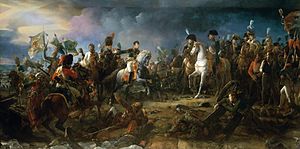Portal:War
The war portal
edit
Introduction
A common perception of war is a series of military campaigns between at least two or more opposing sides involving a dispute over sovereignty, territory, resources, ideology or a host of other issues. A war to liberate an occupied country is sometimes characterised as a "war of liberation", while a war between internal elements of the same state may constitute a civil war. Aside from humans and their primate brethren, ants are the only other animals known to exhibit such behavior on a large scale. A battle is a single engagement fought between two or more parties, wherein each party or aligned group will seek to defeat their opponent. Battles are most often fought during military campaigns and can usually be well defined in time, space and action. Wars are generally the continuum of a related series of battles and are guided by strategy, whereas individual battles are the stage on which tactics are employed. Military history is the recording and analysis of those events in the history of humanity that fall within the category of organised armed conflict, and that relate to the institutions and organizations that prosecute such conflict.
edit
Featured article
The Hungarian Revolution of 1956 was a spontaneous nationwide revolt against the Neo-Stalinist government of Hungary and its Soviet-imposed policies, lasting from October 23 until November 10, 1956. It began as a student demonstration which attracted thousands as it marched through central Budapest to the Parliament building. The revolt spread quickly across Hungary, and the government fell. Thousands organized into militias, battling the State police force and Soviet troops. The new government formally disbanded the State police force, declared its intention to withdraw from the Warsaw Pact and pledged to re-establish free elections. On November 4, a large Soviet force invaded Budapest using artillery and air strikes, killing thousands of civilians. Organized resistance ceased by 10 November 1956, and mass arrests began. An estimated 200,000 Hungarians fled as refugees. By January 1957 the new Soviet-installed government had suppressed all public opposition. Soviet actions alienated many Western Marxists, yet strengthened Soviet control over Eastern Europe, cultivating the perception that communism was both irreversible and monolithic. Public discussion about this revolution was suppressed in Hungary for over 30 years, but since the thaw of the 1980s it has been a subject of intense study and debate.
edit
Did you know...?
edit
Featured picture
Photo credit: Frank Hurley edit
Selected anniversariesJanuary 16
edit
Major topics and categoriesEras of warfareOverview • Prehistoric • Ancient • Medieval • Gunpowder • Industrial • Modern Types of warfareAerial • Amphibious • Arctic • Armoured • Artillery • Asymmetric • Attrition • Biological • Cavalry • Chemical • Conventional • Desert • Electronic • Ground • Guerrilla • Fortification • Herbicidal • Infantry • Information • Jungle • Maneuver • Mechanized • Mercenary • Mountain • Naval • Network-centric • Nuclear • Psychological • Radiological • Siege • Ski • Space • Sub-aquatic • Submarine • Surface • Total • Trench • Unconventional • Urban Categories
ListsArmies • Battles • Civil wars • Corps • Divisions • Fleets • Invasions • Operations • Orders of battle • Sieges • Tactics • Wars • Weapons • World War II Commanders edit
Other Wikimedia projectsedit
Things you can do
|
||||||||||


